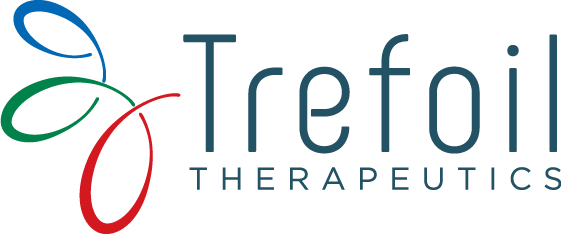
New Trefoil Therapeutics’ Data Presented at ARVO Demonstrate that TTHX1114 Controls Edema in At-Risk Patients Undergoing Cataract Surgery
Company also completes Phase 1 epithelial study to evaluate the safety of topical TTHX1114 to reduce the duration and impact of corneal epithelial defects
SAN DIEGO–(BUSINESS WIRE)–Trefoil Therapeutics, a clinical-stage biotechnology company focused on developing novel new therapeutic agents to treat corneal diseases, today announced a series of data presentations demonstrating the potential use of TTHX1114 to protect endothelial cells at the Association for Research in Vision and Ophthalmology (ARVO) Annual Meeting in New Orleans. The company also announced the completion of the Phase 1 epithelial study designed to assess the safety and dosing profile of TTHX1114 in a topical eye drop formulation for epithelial conditions.
David Eveleth, Ph.D., President and CEO of Trefoil Therapeutics, presented a data update from the Phase 2 STORM study, which evaluated the potential use of TTHX1114 as a way to protect endothelial cells from damage due to cataract surgery in Fuchs endothelial corneal dystrophy (FECD) patients undergoing Descemet Stripping Only (DSO).
New findings included:
- Across all patients, TTHX1114 produced a dose-dependent response in resolution of corneal edema and improvement of best corrected visual acuity (BCVA) following surgery.
- The proportion of patients with complete resolution of corneal edema in the high-dose groups at 28 days after surgery was similar in patients with DSO vs. those with DSO and cataract surgery (25.9% vs 17.4%).
- The proportion of patients recovering adequate BCVA (seeing 69 letters or better) was also similar between these groups, with 58% of the DSO only patients vs. 61% of the DSO and cataract surgery patients at 28 days after surgery.
“Corneal endothelial diseases, like FECD, affect millions of Americans, and today there are limited treatment options. Therefore, it is imperative that we continue to explore new therapies to allow these patients to retain functional vision. It is exciting to see TTHX1114 perform well in controlling post-surgical edema in at-risk patients undergoing cataract surgery,” said Eveleth.
In the poster presentation “Factors affecting recovery following Descemet Stripping Only (DSO) with TTHX1114,” recovery following DSO was evaluated in relation to three variables. Smaller descemetorhexis (surgical removal of Descemet membrane) size was associated with faster recovery while comorbid diabetes appeared to delay recovery. However, visual outcomes for patients undergoing DSO did not appear to be adversely affected by concurrent cataract surgery.
The poster presentation “The engineered fibroblast growth factor TTHX1114 mediates enrichment of proliferative and wound healing pathways in wounded human corneal endothelium,” followed up on Trefoil’s publication earlier this year demonstrating that TTHX1114 accelerates wound healing in the corneal endothelium. RNA-sequencing analysis was performed to identify changes in gene expression and pathway enrichment resulting from treatment with TTHX1114. These results confirmed that treatment of wounded corneal endothelium with TTHX1114 generates a statistically significant shift in gene expression, and specifically produces a response in fibroblast growth factor (FGF) signaling, potentially connected to the previously reported 2.5 times greater wound healing in treated corneas.
Protecting the corneal endothelium from further damage due to oxidative stress is beneficial for FECD patients and cataract patients as the two are closely linked. In the poster presentation, “TTHX1114 protects and rescues primary rabbit corneal endothelial cells from oxidative stress,” data show that TTHX1114 protects and rescues rabbit corneal endothelial cell viability against tBHP induced oxidative stress, supporting TTHX1114 as a promising approach to mitigate endothelial damage.
The abstracts are available at the ARVO 2023 program here.
About TTHX1114
TTHX1114 is an investigational engineered variant of the naturally occurring molecule Fibroblast Growth Factor-1 (FGF1), which stimulates corneal endothelial and epithelial cell proliferation and migration as well as protecting these cells from stress and injury. Trefoil is conducting clinical trials for TTHX1114 as an intracameral injection in patients susceptible to corneal edema due to endothelial damage, including FECD and other corneal endothelial dystrophies (CED) and patients with other risk factors undergoing ocular surgeries. The drug is aimed at protecting and regenerating corneal endothelial cells lost due to disease and thereby improving vision. The topical formulation of TTHX1114 is designed to accelerate corneal ulcer wound healing by stimulating corneal epithelial cell growth, potentially reducing common complications associated with corneal ulcers, such as pain, inflammation, and loss of vision due to corneal scarring. The Phase 1 safety study for the topical product was completed in March of 2023.
About Trefoil Therapeutics
San Diego-based Trefoil Therapeutics is a clinical-stage biotechnology company focused on leveraging its engineered FGF1 protein technology platform to develop first-in-class pharmacologic treatments for serious corneal endothelial diseases and epithelial disorders. Trefoil’s lead product candidate is TTHX1114, an investigational engineered form of naturally occurring FGF1 designed to stimulate corneal cell protection, proliferation and migration, thereby reversing vision loss. The technology underlying Trefoil’s platform was developed by co-founders Michael Blaber, Ph.D., and David Eveleth, Ph.D., and is licensed from Florida State University. Trefoil investors include Bios Partners, Hatteras Venture Partners, Access Biotechnology, Solasta Ventures, InFocus Capital Partners, Correlation Ventures, ExSight Ventures and FemHealth Ventures. Learn more at www.trefoiltherapeutics.com.
Safe Harbor Statement
The clinical research discussed in this press release is preliminary and the outcome of such studies may not be predictive of the outcome of later clinical trials. Future clinical trial results may not demonstrate safety and efficacy sufficient to obtain regulatory approval related to the clinical research findings discussed in this press release.
Contacts
Media Contact
Annika Parrish
Health+Commerce
annika@healthandcommerce.com


